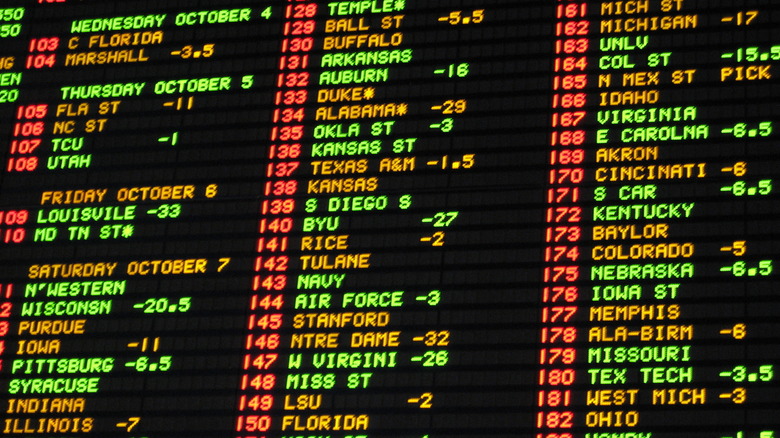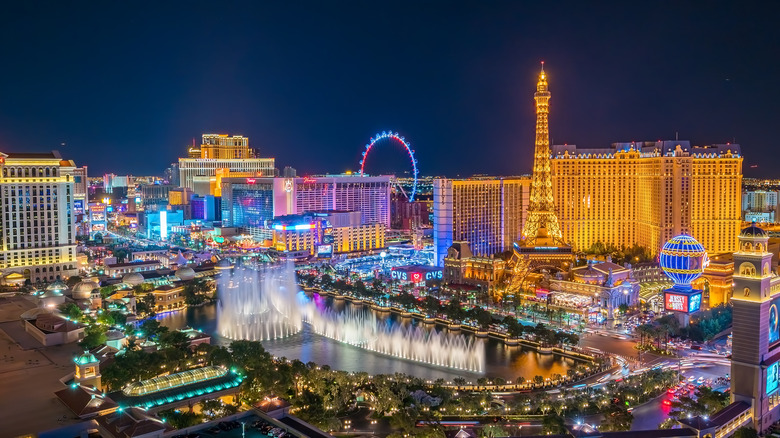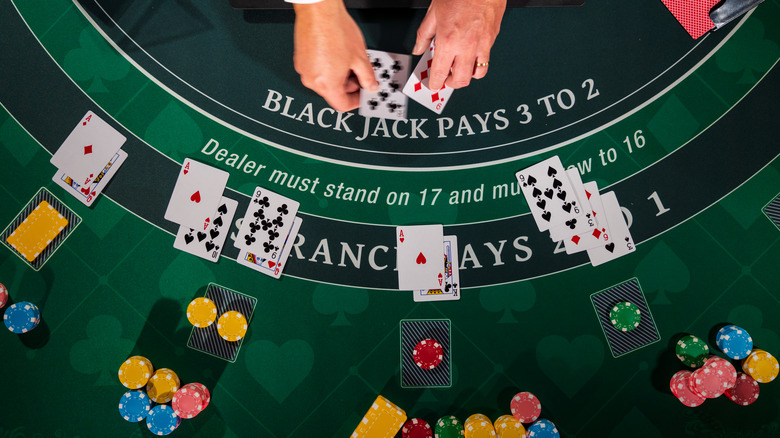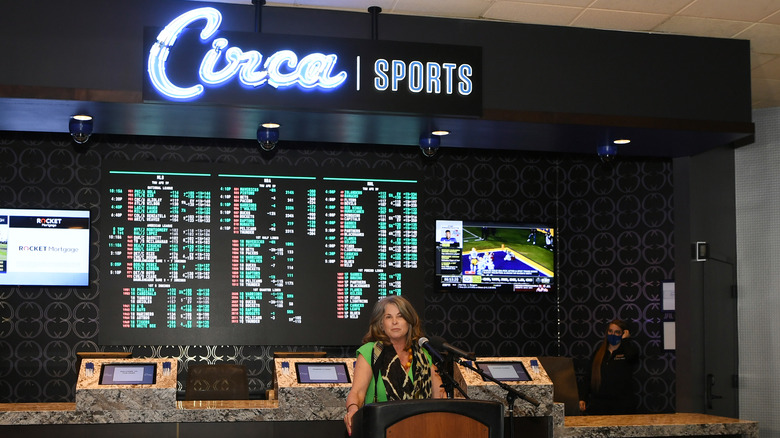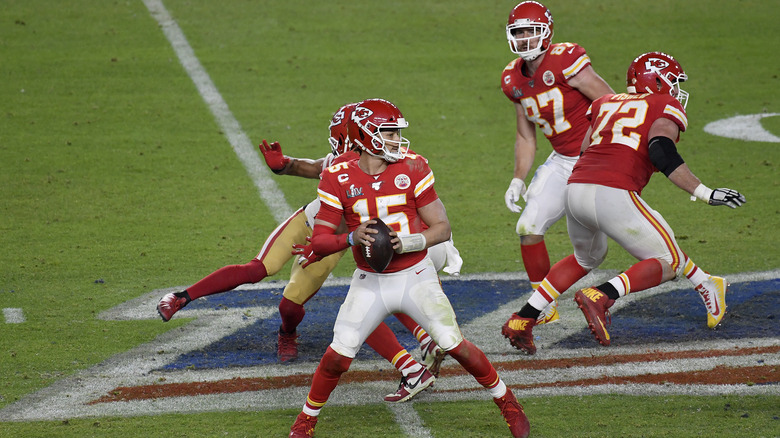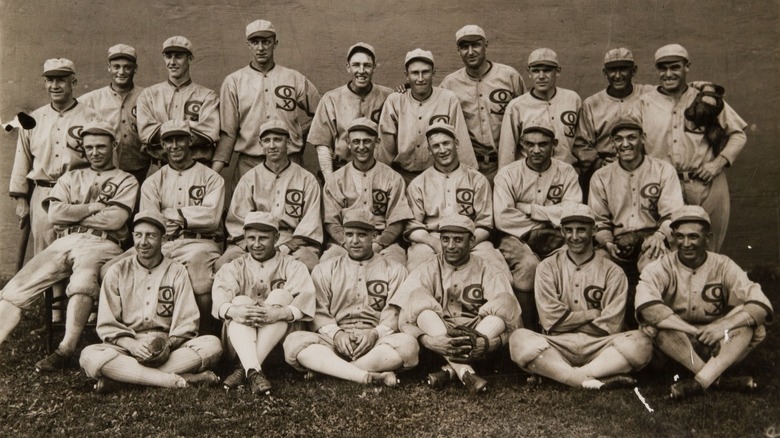Secrets That Sportsbooks Don't Want You To Know
Gambling has been around for much of human history, and even the Bible mentions it, in Matthew 27:35. These days, gambling is no longer confined to an illegal or quasi-legal activity that goes on behind the scenes. It's a whole industry, with whole cities, such as Las Vegas and Reno, devoted to it. Further, in the past few decades, the internet has made it possible for anyone with a connection and disposable income to place a wager — if it's legal in their jurisdiction, of course.
One thing on which bettors have loved to wager has been the outcome of sporting events — a boxing match or a baseball game, for example. For the longest time, this aspect of the gambling industry was handled by "bookies" — men or women who recorded bettors' wagers in books. When the process got absorbed into legal betting enterprises (such as Las Vegas casinos), the name stuck. These days, most if not all casinos will offer "sportsbooks," where you can place a legal wager on the outcome of your favorite team's big game. And if going to a physical casino isn't in the cards, no pun intended, there's always the somewhat-legal internet sports-betting industry.
As in the case of all industries, however, the sportsbook industry has some secrets that it would collectively rather its customer base not find out about.
The legality of the sportsbook industry is complicated
Prior to the waning years of the George H.W. Bush administration, legal sportsbooks (in the United States) were confined to four states, according to CBS News: Nevada (home of Las Vegas), Delaware, Montana, and Oregon. However, two things happened right around that time. First was the passage of the Professional and Amateur Sports Protection Act of 1992 (PASPA), which made it a crime for any of the remaining 46 states to pass laws to legalize sports betting. Second was the emergence of the internet, which brought with it the possibility of wagering without having to go physically to a casino (or a bookie) in order to place a wager, on sports or otherwise.
In 2018, according to CNN, the Supreme Court ruled PASPA largely unconstitutional, effectively allowing the 50 states to set their own laws. The result was a mishmash of conflicting state laws, with some, such as Illinois, allowing the practice (per Legal Sports Report), while others, such as Missouri, forbidding it (per Lineups).
The emergence of gambling online has muddled the picture even further. With international sportsbooks now a thing, U.S.-based sports bettors don't have to go to a brick-and-mortar casino in order to place a wager. However, as Legal Sports Report notes, not all states actually allow residents to place bets online or via a sportsbook's mobile app, although that appears to be quickly changing.
Sportsbooks' profit margins are high, compared to some other forms of gambling
Casinos and sportsbooks exist to make money, and they make that money by keeping back a percentage of the money bettors wager. In the industry, as VSiN reported, that's referred to as the house's "vig" or "juice." In sports betting, sportsbooks and bookies set the propositions (the outcomes on which they'll accept bets) and payouts in such a way that, regardless of the outcome of the game, the sportsbook will get its cut ("the house always wins," as the old saying goes). When it comes to sportsbooks, its cut, or "juice," is around 10% (although different sportsbooks will offer better or worse odds).
That may not seem like much, but in comparison to the payouts in other forms of gambling, it's a sucker bet. For example, according to Wizard of Odds, the casino's vig on Blackjack is a paltry .47 percent, depending on certain minutiae (including the player playing optimally, and the way the casino structures its bets). On some forms of video poker, with optimal play, the house's vig can be in a similar range.
The process relies partially on bettors' ignorance and sentimentality
While there are, of course, sport bettors who will make their wagers based on science, math, and conscientious study of the teams and the odds attached to them, there are just as many who will bet either out of complete ignorance of how sportsbooks work or bet based on sentimentality. For example, a huge Chicago Cubs fan, while he's in Vegas during the baseball preseason, may decide to plunk $20 down on the Cubs winning the World Series at 20-1 odds. That's a sucker bet, but plenty of Cubs fans are willing to risk it, and the casino and other bettors make money from the dupes.
What's more, sportsbooks sometimes rely on a process called "Fading the Public." The math is intricate, but basically, it means that the house structures its propositions and payouts in such a way that may seem counterintuitive to the betting public, with a view toward raking in cash from bettors who don't know any better.
Of course, many simply don't understand the process at all, and its seemingly arcane presentation, filled with numbers, names, and mathematical symbols, can overwhelm the casual tourist. Chris Yuscavage, writing in Complex, explained it succinctly: "They see 'Patriots -1' or 'Patriots/Seahawks Over 47' or 'Super Bowl XLIX Coin Toss—Coin Will Land Heads -103' and are like '¯_(ツ)_/¯.'"
Sports leagues seem to only grudgingly accept it
The four major sports leagues in the United States — Major League Baseball, the National Football League, the National Hockey League, and the National Basketball Association — all seem to have accepted legal sports betting, perhaps grudgingly in some cases.
In 2014, NBA Commissioner Adam Silver said, via The New York Times, that he supported legal sportsbooks. "I believe that sports betting should be brought out of the underground and into the sunlight where it can be appropriately monitored and regulated," he said. His colleague, MLB Commissioner Rob Manfred, supports legalized sports betting, perhaps grudgingly, saying in 2015, via ESPN, that the time had come for a "conversation" about legalizing sports betting. NHL Commissioner Gary Bettman told The Washington Post in 2019 that the Supreme Court's decision forced him to change his mind on the issue, saying "times have changed."
The NFL and Commissioner Roger Goodell were rather reluctant to get on board. After decades of opposing the practice, in 2017, the league issued a statement, available on the NFL website, saying that the league would not oppose legalized sports betting as long as certain controls, such as consumer protection, were in place.
The National Collegiate Athletic Association (NCAA), however, steadfastly opposes legal sports betting, at least on contests it administers. "Sports wagering has the potential to undermine the integrity of sports contests and jeopardizes the well-being of student-athletes and the intercollegiate athletics community," the organization notes on its website.
Does legalized sports betting lead to corruption?
One of the main reasons for opposition to legalized sports gambling has to do with its effects on the athletes themselves. Put simply, more options to bet on sports, more people doing so, and more money changing hands in the process equates to more motivation for the integrity of the matches to be compromised. At least, that's how some critics see things, according to Legal Sports Report.
Whether match-fixing, as it's called in sports parlance, is a widespread problem, or a problem at all, in sports — at least, in the United States — is a difficult question to answer.
Certainly professional sports in the U.S. have been bedeviled by match-fixing, perhaps most famously the 1919 Chicago White Sox, who famously took money from gamblers and threw the World Series. However, John Holden, writing in Legal Sports Report, noted that these days, most American professional athletes are compensated well enough that taking bribes to manipulate the outcome of a bet is just not on their radar. However, Holden also notes that professional athletes in lower-tier sports who don't make as much money, and college athletes in particular (who don't make any), could be compelled to fix matches under the right circumstances. "NCAA athletes [could be] particularly vulnerable to match fixers, especially if they were to come into a time of financial hardship," he wrote.
